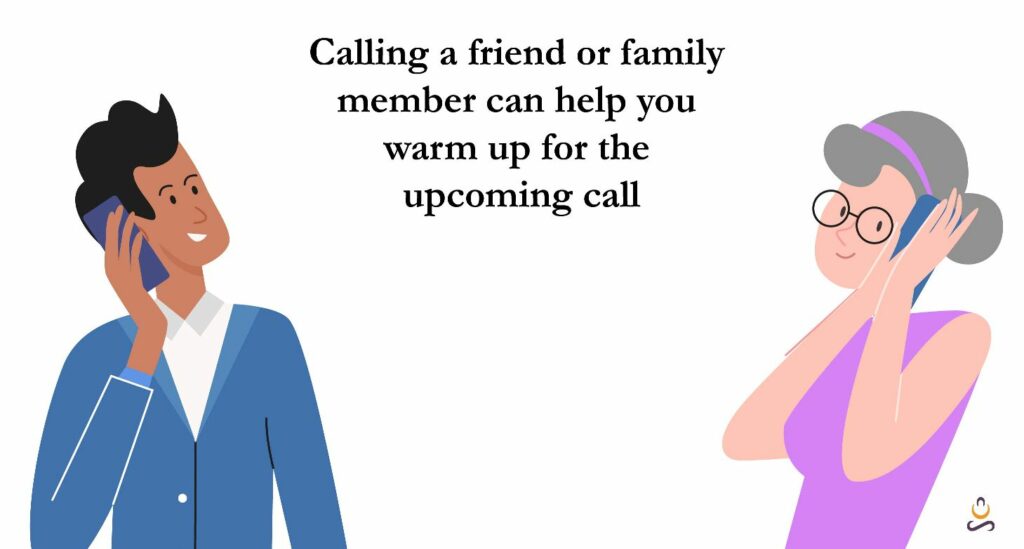It’s been a long day working from home. You have had to attend meetings and meet deadlines. Now, it’s time to place an order at your favorite restaurant – you can either walk there or place a call.
For fluent speakers, the choice is an easy one. Why walk when one can call? But we all know, people who stutter (PWS) will sometimes choose to walk for 10 minutes to place an order, wait and carry it back home rather than place the order over the phone.
Phone calls can be nightmarish for PWS. Making and receiving phone calls can be dreadful for anyone who stutters.
Some say that in face-to-face conversations, 30% of the communication is verbal, and 70% is non-verbal. For PWS, that is incredibly good news. We rely majorly on the non-verbal part of daily communication. A simple nod, head-jerk, or thumbs-up can save us from saying a few extra words!
However, there’s no escape plan when it comes to telephonic conversations. We have to talk!

Why Do I Stutter Worse on the Phone?
As adults, we have to make phone calls, sometimes, several, in one day. Here are some reasons your stutter becomes worse during a phone call –
1. You feel the pressure of responding immediately after the person has stopped talking, or they have asked a question. You believe that you cannot risk a block or prolongation during a conversation where the listener cannot see your face.
2. You are afraid of making a bad first impression whether you are calling a restaurant or a client. You are scared that the person on the other side might perceive you as “slow” because you take time to talk.
3. Maybe you have had a bad experience in the past. The memory and the negative emotions surrounding stuttering add to the anxiety and make your stuttering worse than it is.
4. You cannot replace a feared word with expressions, hand gestures, or body movements during a phone call. That can put extra pressure on anyone who has disfluent speech.
How Do I Stutter Less on the Phone?
Those who stutter employ several tips and tricks while talking on the phone to stutter less. Some of these tricks stem from pure belief.
For example, one man prefers to take his phone calls at the bottom of the stairs with his right foot up one step. He believes it helps him articulate.
Other techniques include pausing strategically, breathing out while speaking, and using a list of topics while making a call. These are some techniques that are based on stuttering therapy.
Make A List
When on a call, we tend to meander from the topics, especially when our disfluencies take over.
It will help you tremendously if you can make a list of the topics you want to discuss. It can be a list of items you want to order, or health concerns you want to talk about.
This practice will ensure that you don’t have to remember the points while you are trying hard to not block or prolong.
You will always have a visual cue. While making the list you will also get the time to think about how to approach each topic by avoiding your trigger words during the phone conversation.
Practice Making Phone Calls
Have an important call? Make a practice call before that.
A practice call can be a call you make to your local store to enquire if they stock a particular item. You can call your friend or mum to have a brief chat about your upcoming call.

You can also call numbers that use a voice-activated system.
Try to be casual about it. The more you practice, the less stressed you will feel during the actual phone call.
Introduce Yourself as Someone who Stutters
When you are calling a new place or person, tell them that you stutter. It’s not something you do voluntarily, so any adult should be empathetic and patient towards your speech disfluency.
Many of us are already pretty used to being hung up on, especially when blocking.
So, instead of waiting for someone to hang up on us, we should just go ahead with a “hello, I’m John, and I stutter. I may take up more time than the average caller, so please be patient.”
You can frame it any way you like. Avoid your feared words. However, you will be surprised to see how many people will show patience and not hang up once you introduce yourself as someone who stutters.
Apply Speech Therapy Techniques
Have you already attended speech therapy? If so, you should be familiar with the practices of easy onsets, pull-outs, costal breathing, and beginning speech while starting to exhale.
If not, you can try using a stuttering therapy app like Stamurai. It is a speech therapy app that can teach you fluency techniques.

It is not like you stutter only on the phone. You stutter while talking, and that’s alright. You have applied speech therapy techniques IRL, so why not try them while you are on a call?
Speech therapy can help make phone calls less intimidating for you. It can also help you stutter less while on the phone.
Record and Listen To Yourself
It might feel awkward in the initial days, but you need to record yourself while on the phone. Playing it back, you will be able to understand how your speech is different from a face-to-face conversation.
A video recording is often more helpful since you will be able to see the changes in your body language and movements.
Note your rate of speech and blocks. Make a list of words that lead to blocks or prolongations during each call.
Learn from the recording. Prepare for your next call. It might feel weird listening or watching yourself talk on the phone, but it will help you beyond your imagination.

Will You Ever Stutter Less During a Phone Call?
Practice can make phone calls easier and less scary for you. Once you find a way to control the negative emotions and bad memories, it can help you stutter less during a phone call.
Take time to answer a call, but also try to be the person who answers every call. Those “annoying” sales calls might be the right practicing opportunity for you.
Give your listener the benefit of the doubt. Always admit that you stutter at the beginning of a call. It is indeed trying, but you will find a script that you can stick to while starting a phone call.
Don’t let a piece of tech dominate your fears. It is much better and easier to use the phone and stutter than avoiding it entirely.










